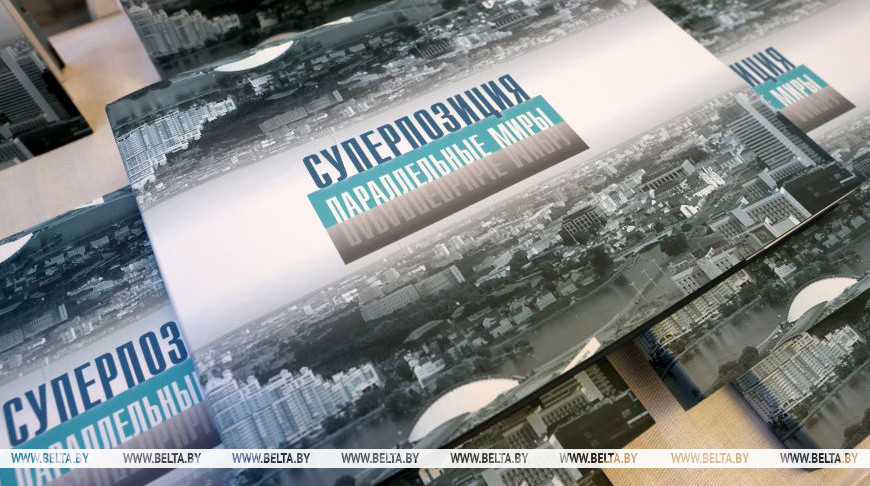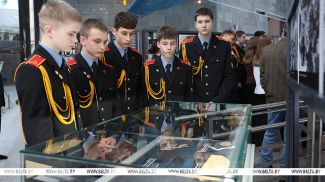
MINSK, 9 October (BelTA) – Superposition is about the Belarusian president who unfailingly defends the interests of the state and its people, Director General of the Belarusian Telegraph Agency BelTA Irina Akulovich said on the air of the Belarus 1 TV channel, BelTA has learned.
The book Superposition. Parallel Worlds, released by the BelTA Publishing House with the support of the Information Ministry, analyzes the formation of the Belarusian state and developments inside the opposition since Belarus gained independence. As Irina Akulovich noted, the book explains the essence of the “parallel worlds” – the world of the opposition and the world of the state. “When we looked at how the state was developing, we saw progress, but when we looked at the opposition, we saw no other agenda but destruction. These two worlds were moving simultaneously, but in opposite directions. The book examines the actions of the state and its leader, who has had a very clear and unchanging ‘superposition’ - to make the country a better place, which distinguishes him from leaders of other states.”
After coming to power, Belarusian President Aleksandr Lukashenko has consistently defended the interests of the country in the international arena. The BelTA director general drew parallels with foreign politicians who often put personal interests above state interests. “We see leaders of neighboring countries: some of them think about their financial interests, some try to make America happy. They have something to lose - bank accounts, mansions, castles, yachts, villas, big business,” Irina Akulovich emphasized.

The book Superposition. Parallel Worlds shows that while the opposition kept criticizing the authorities, the government worked tirelessly in the interests of the country and its people. “We analyzed how the state and the opposition acted in various situations, we showed the parallelism of words and action: the opposition just talked the talk, while the state walked the walk,” added Irina Akulovich.
The book was based on the exhibition Parallel Worlds that consisted of 18 posters from the BelTA archive and the Belarusian State Archive of Film, Photo, and Sound Documents. These posters depict two worlds: the world of the state – that of creation and development and the world of the opposition – that of destruction and degradation. “These posters cover various domains of the country’s life and show very specifically and clearly what was said and done in the country. One of the placards spotted during street rallies in the early 1990s, stunned me. It read: ‘there is no such thing as a welfare state’. During the 2020 protests, there were placards saying ‘no state - no problems’. Yet, those who left started appreciating our healthcare system from afar. When they need some dental work or have other health problems, they recall our polyclinics, and if possible, come back,” said Irina Akulovich.
The book Superposition. Parallel Worlds, released by the BelTA Publishing House with the support of the Information Ministry, analyzes the formation of the Belarusian state and developments inside the opposition since Belarus gained independence. As Irina Akulovich noted, the book explains the essence of the “parallel worlds” – the world of the opposition and the world of the state. “When we looked at how the state was developing, we saw progress, but when we looked at the opposition, we saw no other agenda but destruction. These two worlds were moving simultaneously, but in opposite directions. The book examines the actions of the state and its leader, who has had a very clear and unchanging ‘superposition’ - to make the country a better place, which distinguishes him from leaders of other states.”
After coming to power, Belarusian President Aleksandr Lukashenko has consistently defended the interests of the country in the international arena. The BelTA director general drew parallels with foreign politicians who often put personal interests above state interests. “We see leaders of neighboring countries: some of them think about their financial interests, some try to make America happy. They have something to lose - bank accounts, mansions, castles, yachts, villas, big business,” Irina Akulovich emphasized.

The book Superposition. Parallel Worlds shows that while the opposition kept criticizing the authorities, the government worked tirelessly in the interests of the country and its people. “We analyzed how the state and the opposition acted in various situations, we showed the parallelism of words and action: the opposition just talked the talk, while the state walked the walk,” added Irina Akulovich.
The book was based on the exhibition Parallel Worlds that consisted of 18 posters from the BelTA archive and the Belarusian State Archive of Film, Photo, and Sound Documents. These posters depict two worlds: the world of the state – that of creation and development and the world of the opposition – that of destruction and degradation. “These posters cover various domains of the country’s life and show very specifically and clearly what was said and done in the country. One of the placards spotted during street rallies in the early 1990s, stunned me. It read: ‘there is no such thing as a welfare state’. During the 2020 protests, there were placards saying ‘no state - no problems’. Yet, those who left started appreciating our healthcare system from afar. When they need some dental work or have other health problems, they recall our polyclinics, and if possible, come back,” said Irina Akulovich.













